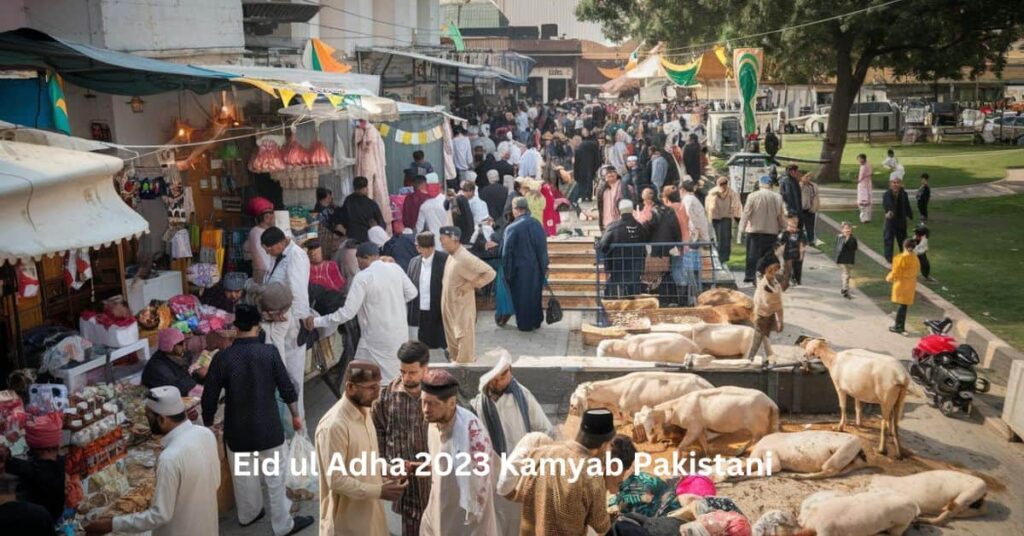Eid ul Adha 2023 Kamyab Pakistani: A Comprehensive Guide

Eid ul Adha, also known as the Festival of Sacrifice, is one of the most significant holidays for Muslims around the world. It commemorates the willingness of Prophet Ibrahim (Abraham) to sacrifice his son in obedience to God. This holiday is marked by special prayers, the sacrifice of animals, and acts of charity. In 2023, Eid ul Adha holds special significance for many, especially for the Pakistani community, and promises to be a momentous occasion. This article will provide an in-depth look at Eid ul Adha 2023, with a focus on its celebration within the Pakistani community, exploring the cultural, religious, and social aspects that make it a memorable event.
Understanding Eid ul Adha
Eid ul Adha is celebrated on the 10th day of Dhu al-Hijjah, the last month of the Islamic lunar calendar. The date of Eid ul Adha can vary depending on moon sightings in different parts of the world. For 2023, it is predicted to begin at sunset on June 16, 2024. This prediction is subject to change based on the actual sighting of the moon, which can vary slightly from one country to another.
The holiday commemorates the story of Prophet Ibrahim and his son Ismail (Ishmael). According to Islamic tradition, Ibrahim was commanded by God to sacrifice his son as a test of faith. Just as Ibrahim was about to carry out the command, God provided a ram to sacrifice instead. This act of obedience and faith is remembered through the sacrifice of animals during Eid ul Adha.
Eid ul Adha 2023: Kamyab Pakistani Celebrations
Kamyab Pakistani translates to “Successful Pakistani,” and this year’s Eid ul Adha will be marked with a sense of achievement and joy within the Pakistani community. Here’s a closer look at how this special day is celebrated and what makes it significant.
1. Preparation for Eid ul Adha
In preparation for Eid ul Adha, Pakistani families begin their celebrations by cleaning and decorating their homes. Special clothes are purchased, often new and traditional, to wear on the day of the festival. This is a time of anticipation and excitement as families prepare to come together for prayer and the sacrifice.
Grocery Shopping and Cooking: A significant aspect of preparation involves grocery shopping and cooking. Special dishes are prepared, including traditional Pakistani foods such as kebabs, biryanis, and various sweets like gulab jamun and jalebi. The meat from the sacrificial animal is often distributed among family, friends, and those in need, ensuring that everyone can partake in the celebration.
Animal Sacrifice: The act of sacrificing an animal is central to Eid ul Adha. In Pakistan, this often involves purchasing a goat, sheep, or cow. The animal is slaughtered in accordance with Islamic guidelines, and the meat is divided into three parts: one-third for the family, one-third for friends and relatives, and one-third for the poor and needy. This distribution reflects the spirit of charity and generosity that defines Eid ul Adha.
2. Religious Observances
Eid Prayer: The day begins with the special Eid prayer, which is usually held in large congregational settings such as mosques or open fields. This prayer is performed in the morning, often followed by a sermon that emphasizes the values of sacrifice, faith, and community. It is a time of reflection and gratitude.
Charity and Community Service: Eid ul Adha is not just about personal celebrations but also about giving back to the community. Many Pakistani families use this opportunity to provide for those less fortunate, engaging in acts of charity and community service. This may include donating meat to local food banks or organizing community meals for the underprivileged.
3. Cultural Festivities
Family Gatherings: Eid ul Adha is a time for family reunions. Relatives and friends come together to celebrate, share meals, and enjoy each other’s company. This social aspect of the holiday fosters a sense of unity and strengthens familial bonds.
Traditional Practices: In addition to the religious and charitable aspects, Eid ul Adha is celebrated with various traditional practices. This includes wearing traditional Pakistani attire such as shalwar kameez, performing rituals like visiting graves of loved ones, and participating in festive activities and games.
Festive Decorations: Homes and public spaces are often decorated with lights, banners, and other festive decorations. This creates a joyful atmosphere and enhances the celebratory mood of Eid ul Adha.
4. The Impact of Eid ul Adha on Pakistani Society
Eid ul Adha holds significant cultural and social importance in Pakistan. It reinforces the values of sacrifice, charity, and community. The holiday also has a substantial economic impact, as the demand for livestock and festive goods increases during this period. This boost in economic activity provides a livelihood for many in the agricultural and retail sectors.
Economic Benefits: The celebration of Eid ul Adha contributes to the local economy through the purchase of livestock, festive goods, and services. This economic activity supports various businesses and creates jobs, benefiting the community as a whole.
Social Unity: Eid ul Adha promotes social unity and cohesion. By coming together for prayers, sacrifices, and community service, Pakistani Muslims strengthen their bonds with one another and with those in need. This sense of solidarity is a core value of the holiday.
FAQs About Eid ul Adha 2023 Kamyab Pakistani
Q1: What is the exact date of Eid ul Adha 2023? A1: Eid ul Adha 2023 is predicted to begin at sunset on June 16, 2024. However, the exact date may vary depending on the sighting of the moon.
Q2: How is Eid ul Adha celebrated in Pakistan? A2: Eid ul Adha in Pakistan is celebrated with special prayers, the sacrifice of animals, and festive meals. Families prepare by cleaning their homes, buying new clothes, and preparing traditional dishes. The meat from the sacrificed animal is distributed among family, friends, and the needy.
Q3: What is the significance of the animal sacrifice during Eid ul Adha? A3: The animal sacrifice during Eid ul Adha commemorates the willingness of Prophet Ibrahim to sacrifice his son in obedience to God. The act symbolizes faith and obedience, and the distribution of meat reflects the values of charity and generosity.
Q4: How can I participate in charitable activities during Eid ul Adha? A4: You can participate in charitable activities by donating meat to local food banks, organizing community meals, or contributing to organizations that support those in need. The spirit of Eid ul Adha encourages giving and helping those less fortunate.
Q5: What traditional foods are commonly enjoyed during Eid ul Adha in Pakistan? A5: Traditional foods enjoyed during Eid ul Adha in Pakistan include kebabs, biryanis, and various sweets such as gulab jamun and jalebi. These dishes are prepared as part of the festive meals shared with family and friends.
Conclusion
Eid ul Adha 2023 promises to be a memorable occasion for the Pakistani community, marked by a sense of achievement and joy. The celebrations will encompass traditional practices, religious observances, and acts of charity, reflecting the true spirit of the holiday. By coming together for prayers, sacrifices, and community service, the Pakistani community will honor the values of faith, sacrifice, and generosity that define Eid ul Adha.
Whether you are part of the Pakistani community or simply interested in learning about this significant holiday, understanding the cultural and religious aspects of Eid ul Adha enriches the appreciation of this special time. The holiday not only celebrates a historical event but also reinforces the values that bring people together and foster a sense of unity and compassion.





